With slew of specialties, rural health care providers serve as ‘a reliable resource’
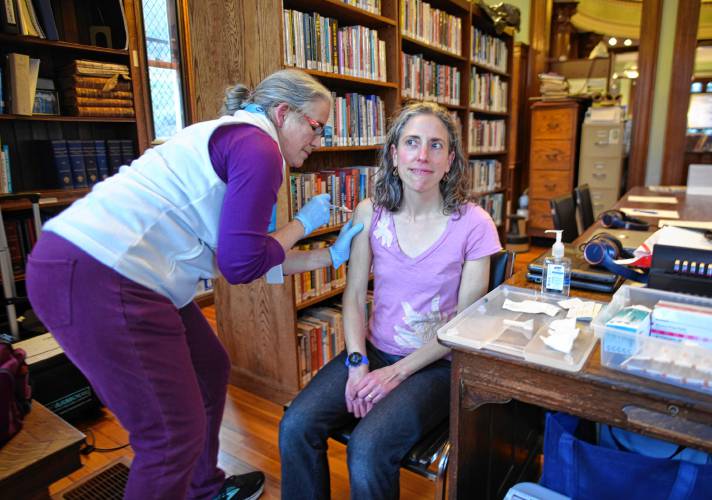
Meg Ryan, a public health nurse with the Franklin Regional Council of Governments, gives Ashfield resident Talia Miller a flu shot during a health clinic at Griswold Memorial Library in Colrain on Wednesday. Thursday, Nov. 16 marks National Rural Health Day. STAFF PHOTO/PAUL FRANZ
| Published: 11-15-2023 7:08 PM |
Some people choose to live in rural areas for the slower pace of life. Some enjoy being closer to nature and farther away from the hustle and bustle of city life. Still others are capitalizing on the more affordable real estate.
Whatever the reason may be, the tranquil lifestyle nearly always comes with more challenging access to health care due to transportation issues.
Rural Americans often face numerous health disparities compared to their urban counterparts, and are more likely to die from heart disease, cancer, unintentional injury, chronic lower respiratory disease and stroke. With this in mind, the National Organization of State Offices of Rural Health has since 2011 set aside the third Thursday of November as “National Rural Health Day” to call attention to the efforts of rural health care providers, communities, organizations and other stakeholders dedicated to addressing the unique health care needs in remote locations.
Phoebe Walker, director of community health at the Franklin Regional Council of Governments, said there are “a robust batch of local public health nurses” in the county for the first time in about 80 years and many specialize in fields particularly relevant to rural settings. Michael Archbald, public health nurse with the Foothills Health District, for example, spends his days visiting elders in their homes to administer health care.
“The need is huge, and helping people stay in their own homes is our mission. It’s the mission of public health in Massachusetts,” he said. “I love it. I love doing home visits. I love helping people figure out the complicated health services needed.”
Archbald explained he checks patients’ vital signs, helps them with their acute and chronic illnesses, and provides resources for additional services. On Wednesday afternoon, he was on his way to Goshen to visit a client in need of a high-dose flu shot.
“It’s extremely fulfilling, because otherwise these folks just could not get those appointments — they wouldn’t happen,” he said.
Archbald, who serves Goshen, Whately, Westhampton and Williamsburg, is entering his 30th year as a registered nurse. He became a public health nurse through a Public Health Excellence Grant during the COVID-19 pandemic. Previously, he owned Collective Home Care in Hatfield for 20 years, providing at least a million hours of elder services in Franklin and Hampshire counties. He was a psychiatric nurse for 10 years prior to that.
Article continues after...
Yesterday's Most Read Articles
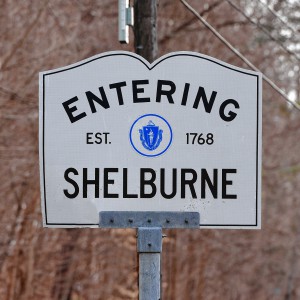 Serious barn fire averted due to quick response in Shelburne
Serious barn fire averted due to quick response in Shelburne
 Bridge of Flowers in Shelburne Falls to open on plant sale day, May 11
Bridge of Flowers in Shelburne Falls to open on plant sale day, May 11
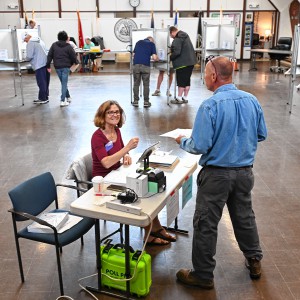 Political newcomer defeats Shores Ness for Deerfield Selectboard seat
Political newcomer defeats Shores Ness for Deerfield Selectboard seat
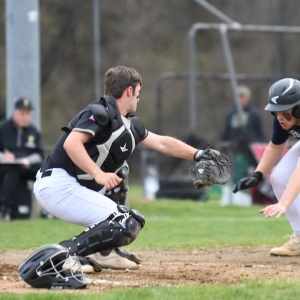 Roundup: Pioneer baseball wins Suburban League West title following 2-0 win over Hopkins
Roundup: Pioneer baseball wins Suburban League West title following 2-0 win over Hopkins
 As I See It: Between Israel and Palestine: Which side should we be on, and why?
As I See It: Between Israel and Palestine: Which side should we be on, and why?
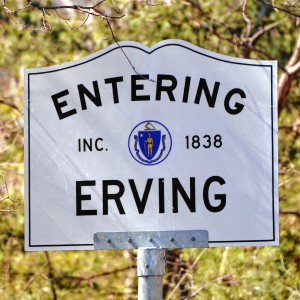 Employee pay, real estate top Erving Town Meeting warrant
Employee pay, real estate top Erving Town Meeting warrant
According to Walker, Public Health Nurse Robin Neipp educates people on safe gun storage and Narcan training. Narcan reverses opioid overdoses.
Megan Tudryn, Greenfield’s public health nurse, said the Greenfield Health Department offers the unhoused population a free store with items such as toothpaste, toothbrushes, insect repellent, deodorant and some over-the-counter medications. She also said she routinely uses a mobile wagon to distribute these items to the unhoused.
“We’re a big resource for them,” she said. “There were some people showering in sinks in restaurants and Town Hall, and so we let them know where they could get free showers — at The Salvation Army — and free laundry.”
Tudryn said the Greenfield Health Department also gives out Narcan, as well as fentanyl and xylazine test strips. Fentanyl is a powerful synthetic opioid similar to morphine but 50 to 100 times more potent. Xylazine is a veterinary sedative, and people who use intravenous drugs cut with it develop necrosis, or tissue death, at the injection site because it was not created to be used intravenously or by humans. Fentanyl and xylazine have made their way into the drug supply because they are inexpensive, and drug cartels want to cut their product and increase their profit margins.
Tudryn also mentioned Greenfield has participated in a menstrual equity project by providing menstrual supplies for bathrooms at Greenfield High School, Greenfield Middle School and Frontier Regional School.
She said Greenfield is part of the Valley Health Regional Collaborative, which works together to meet health needs in partner towns. According to the city’s website, the collaborative was formed with partial funding from a Public Health Excellence Grant from a state program designed to create cross-jurisdictional public health services.
Meg Ryan, a public health nurse with FRCOG for 2½ years who is particularly interested in issues associated with aging, age bias and dementia, said the long driving distances associated with rural living often pose a transportation problem for people when it comes to health care.
“So we like to go and meet people where they are,” she said.
Ryan explained FRCOG holds walk-in wellness hours at senior centers, food pantries and housing facilities in its 15 member towns.
“We just want to be a reliable resource to people,” she said. “We help people with chronic disease screening, blood pressure screening, talk about any concerns that they may have and direct them to other resources.”
More information about National Rural Health Day is available at powerofrural.org.
Reach Domenic Poli at: dpoli@recorder.com or 413-930-4120.

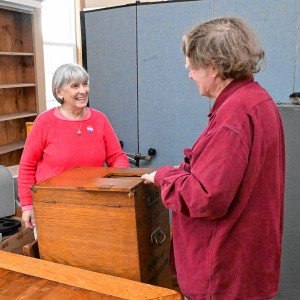 New Salem election ushers in new Selectboard member
New Salem election ushers in new Selectboard member Community Legal Aid expands Disability Benefits Project to Franklin County
Community Legal Aid expands Disability Benefits Project to Franklin County
